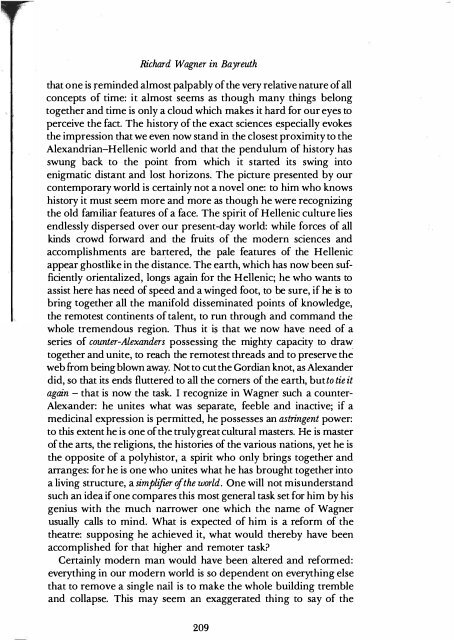Friedrich_Nietzsche - Untimely_Meditations_(Cambridge_Texts_in_the_History_of_Philosophy__1997)
Friedrich_Nietzsche - Untimely_Meditations_(Cambridge_Texts_in_the_History_of_Philosophy__1997)
Friedrich_Nietzsche - Untimely_Meditations_(Cambridge_Texts_in_the_History_of_Philosophy__1997)
Create successful ePaper yourself
Turn your PDF publications into a flip-book with our unique Google optimized e-Paper software.
Richard Wagner <strong>in</strong> Bayreuththat one is rem<strong>in</strong>ded almost palpably <strong>of</strong> <strong>the</strong> very relative nature <strong>of</strong> allconcepts <strong>of</strong> time: it almost seems as though many th<strong>in</strong>gs belongtoge<strong>the</strong>r and time is only a cloud which makes it hard for our eyes toperceive <strong>the</strong> fact. The history <strong>of</strong> <strong>the</strong> exact sciences especially evokes<strong>the</strong> impression that we even now stand <strong>in</strong> <strong>the</strong> closest proximity to <strong>the</strong>Alexandrian-Hellenic world and that <strong>the</strong> pendulum <strong>of</strong> history hasswung back to <strong>the</strong> po<strong>in</strong>t from which it started its sw<strong>in</strong>g <strong>in</strong>toenigmatic distant and lost horizons. The picture presented by ourcontemporary world is certa<strong>in</strong>ly not a novel one: to him who knowshistory it must seem more and more as though he were recogniz<strong>in</strong>g<strong>the</strong> old fam iliar features <strong>of</strong> a face. The spirit <strong>of</strong> Hellenic culture liesendlessly dispersed over our present-day world: while forces <strong>of</strong> allk<strong>in</strong>ds crowd fO lWard and <strong>the</strong> fruits <strong>of</strong> <strong>the</strong> modern sciences andaccomplishments are bartered, <strong>the</strong> pale features <strong>of</strong> <strong>the</strong> Hellenicappear ghostlike <strong>in</strong> <strong>the</strong> distance. The earth, which has now been sufficientlyorientalized, longs aga<strong>in</strong> fo r <strong>the</strong> Hellenic; he who wants toassist here has need <strong>of</strong> speed and a w<strong>in</strong>ged fo ot, to be sure, if he is tobr<strong>in</strong>g toge<strong>the</strong>r all <strong>the</strong> manifold dissem<strong>in</strong>ated po<strong>in</strong>ts <strong>of</strong> knowledge,<strong>the</strong> remotest cont<strong>in</strong>ents <strong>of</strong> talent, to run through and command <strong>the</strong>whole tremendous region. Thus it i that we now have need <strong>of</strong> aseries <strong>of</strong> counter-Alexanders possess<strong>in</strong>g <strong>the</strong> mighty capacity to drawtoge<strong>the</strong>r and unite, to reach <strong>the</strong> remotest threads and to preserve <strong>the</strong>web from be<strong>in</strong>g blown away. Not to cut <strong>the</strong> Gordian knot, as Alexanderdid, so that its ends fluttered to all <strong>the</strong> corners <strong>of</strong> <strong>the</strong> earth, butto tie itaga<strong>in</strong> - that is now <strong>the</strong> task. I recognize <strong>in</strong> Wagner such a counterAlexander: he unites what was separate, feeble and <strong>in</strong>active; if amedic<strong>in</strong>al expression is permitted, he possesses an astr<strong>in</strong>gent power:to this extent he is one <strong>of</strong> <strong>the</strong> truly great cultural masters. He is master<strong>of</strong> <strong>the</strong> arts, <strong>the</strong> religions, <strong>the</strong> histories <strong>of</strong> <strong>the</strong> various nations, yet he is<strong>the</strong> opposite <strong>of</strong> a polyhistor, a spirit who only br<strong>in</strong>gs toge<strong>the</strong>r andarranges: fo r he is one who unites what he has brought toge<strong>the</strong>r <strong>in</strong>toa liv<strong>in</strong>g structure, a simplifier <strong>of</strong> <strong>the</strong> world. One will not misunderstandsuch an idea if one compares this most general task set for him by hisgenius with <strong>the</strong> much narrower one which <strong>the</strong> name <strong>of</strong> Wagnerusually calls to m<strong>in</strong>d. What is expected <strong>of</strong> him is a reform <strong>of</strong> <strong>the</strong><strong>the</strong>atre: suppos<strong>in</strong>g he achieved it, what would <strong>the</strong>reby have beenaccomplished fo r that higher and remoter task?Certa<strong>in</strong>ly modern man would have been altered and reformed:everyth<strong>in</strong>g <strong>in</strong> our modern world is so dependent on everyth<strong>in</strong>g elsethat to remove a s<strong>in</strong>gle nail is to make <strong>the</strong> whole build<strong>in</strong>g trembleand collapse. This may seem an exaggerated th<strong>in</strong>g to say <strong>of</strong> <strong>the</strong>209


